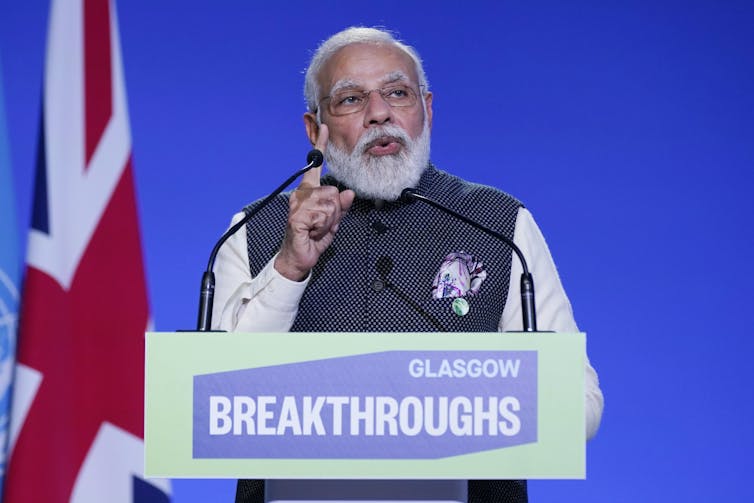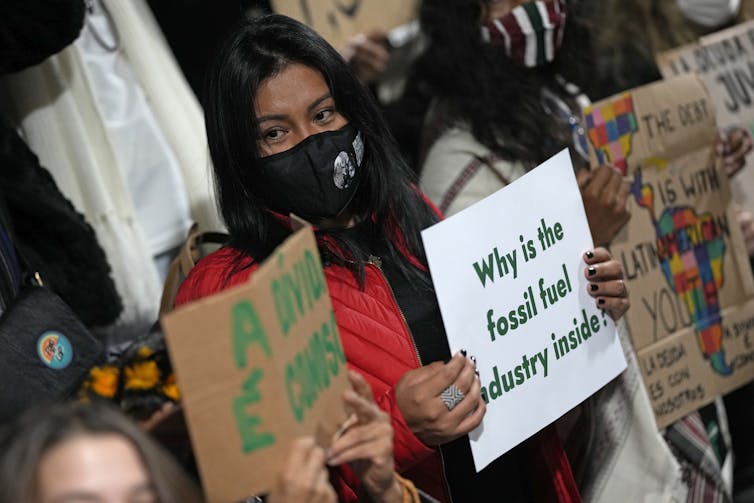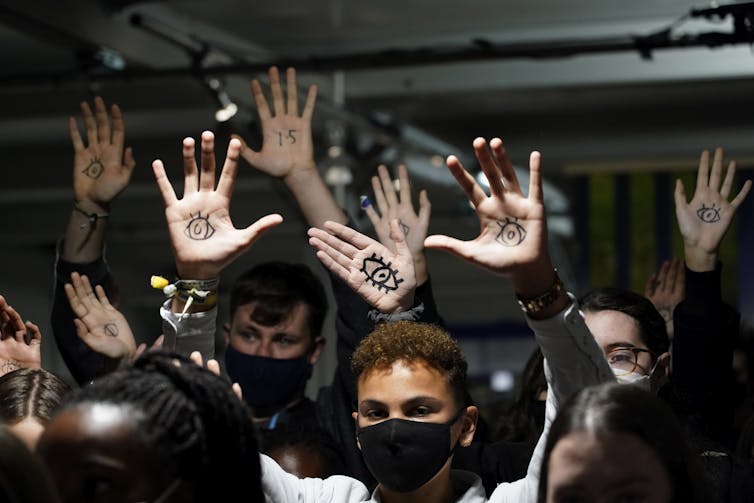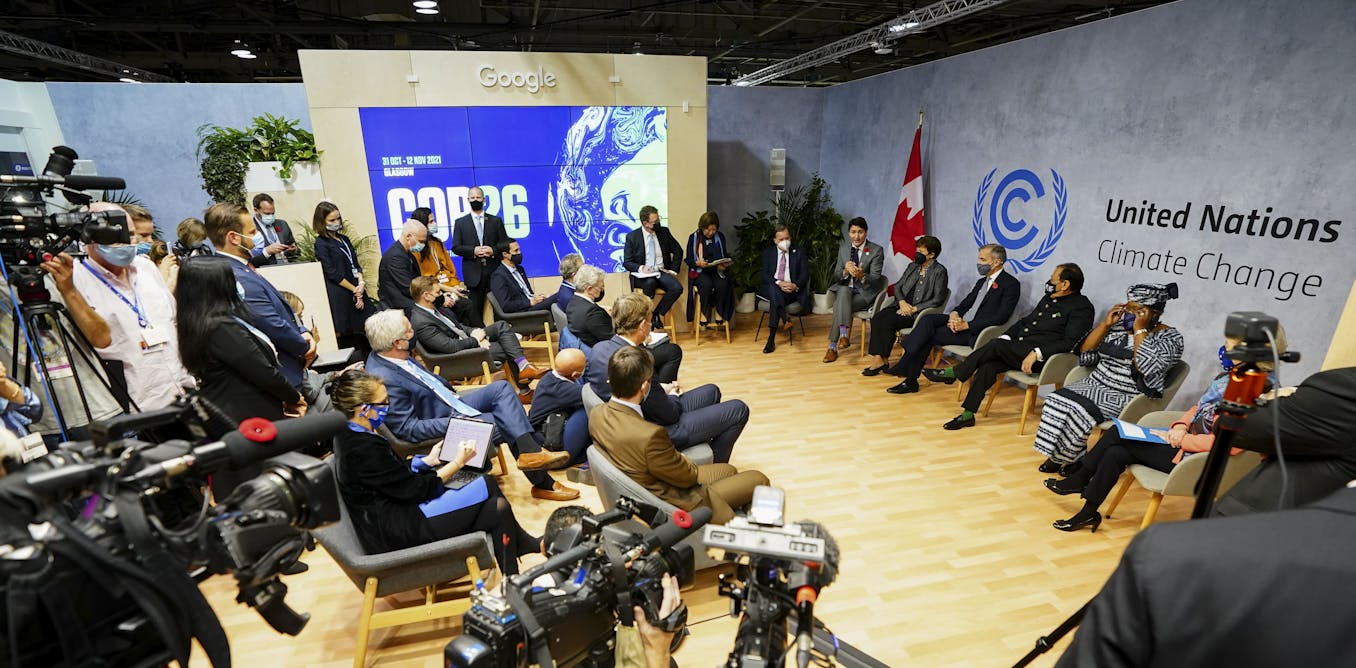Climate change denial 2.0 was on full display at COP26, but there was also pushback
The recent climate conference in Glasgow, Scotland, shows that climate change deniers have shifted their tactics to thwart the efforts of countries to phase out fossil fuel use.


The COP26 summit in Glasgow, Scotland, saw incremental progress on addressing climate change. But even if countries meet their current commitments to reduce emissions, the planet is on course to heat up 2.4 C by the end of the century. This warming will submerge low-lying islands and coastal regions and lead to climate disasters globally.
Despite knowing this, it remains difficult for governments to address the climate crisis. Part of the reason is the phenomena of climate change denial, obstructionism and the lobbying and public relations efforts of the fossil fuel sector.
We are three sociologists who study social aspects of climate change, environmental politics and other environmental issues. One of us (David) attended the climate summit in Glasgow, as well as the Paris conference in 2015. The most recent conference illustrates the shifts in the tactics used by climate change deniers towards what we call “climate change denial 2.0.”
Climate change denial
Climate change denial takes several forms. The “classic” form involves strategic action by organizations to challenge or spread doubt that human-caused climate change is real.
As several analysts have shown, organized climate change denial has played a major role in shaping media coverage, public opinion and thwarting progress on climate change policy for the past three decades. Some of the key players include: corporations, conservative think tanks and foundations; wealthy individuals (such as Charles and David Koch), who help fund key organizations involved in climate change denial; lobbying firms and conservative media. Researchers who have studied the relationships among these groups found they constitute a climate change denial movement network.
This network has thwarted effective national level climate policy, especially in the United States. It has also contributed to slowing efforts at addressing climate change in other countries, including Canada, the United Kingdom and Australia.
For example, according to an investigation by the Canadian Centre for Policy Alternatives, the fossil fuel industry played a central role in crafting British Columbia’s disappointing 2016 climate change plan. In addition, key government meetings were held at the headquarters of Canada’s largest fossil fuel industry lobbying organization, where lobbyists reportedly led an effort to weaken the text.
Climate change denial 2.0
While outright climate denial works to varying degrees in the context of domestic politics in some countries, it would not be credible in the forum of the COP process. New strategies were needed.
Newer forms of this phenomenon might be called climate change denial 2.0. Backers do not deny that climate change is real or serious. Instead they undermine the need to take immediate bold action, and obstruct progress on decarbonization.

A recent incident during a COP26 plenary held on Nov. 4 illustrates this. The plenary was devoted to the Intergovernmental Panel on Climate Change’s (IPCC) recent report on the physical science basis for climate change, part of the Sixth Assessment report. A delegate representing India told Valérie Masson-Delmotte, the plenary speaker and the report’s lead author, that the report was too gloomy. He said India had previously requested that a section on mitigation be removed, as well as references to to low-probability high-risk events (like the collapse of Antarctic ice sheets), and again insisted that these changes be made.
Read more: Coal: why China and India aren't the climate villains of COP26
This all seemed somewhat incongruous to both the audience and the presenters. While the IPCC reports inform the COP negotiations, they are separate, independent, prior processes, and are based on science not political considerations. Nevertheless, this intervention highlights denial 2.0 efforts.
Denial efforts during negotiations
Denial 2.0 efforts often involve the symbolic politics of saying the right things on climate change, while nudging or redirecting climate policy to minimize its impacts on the interests of the fossil fuel sector. Heading into the conference Saudi Arabia, Japan and Australia were among those countries that asked the United Nations “to play down the need to move rapidly away from fossil fuels,” as a document leak reported by BBC revealed.
At COP26, fossil fuel interests also had an outsized presence. There were 503 fossil fuel lobbyists accredited for the meetings, more than the number of accredited delegates for any single country. NGO representatives noted there were about twice as many fossil fuel lobbyists present as accredited Indigenous representatives, even though Indigenous Peoples are among the most negatively affected by climate change.

Push back against climate denial
The environmental movement has mobilized against messages of climate denial and efforts to maintain and expand the fossil fuel energy sector. Climate activists have been vocal in their support for a just transition away from fossil fuels. Their tactics include: litigation, targeting businesses, working within the political system and confrontational protest.
This played out in Glasgow with the Climate Strike organized by Fridays for the Future, which was attended by 25,000 people on Nov. 6. Youth activists and Fridays for Future (along with with other groups) also established the Fossil Fuel Non-Proliferation Treaty, which pushes for the rapid phase out of fossil fuels. It has now been endorsed by 150 legislators from 30 countries, as well as by 100 Nobel Prize laureates, and several thousand scientists.

Furthermore, a group co-chaired by Denmark and Costa Rica launched the Beyond Oil and Gas Alliance, which aims to phase out the production of oil and gas. Québec, which had recently committed to permanently banning all oil and gas exploration and extraction, joined the alliance last week.
These actions have been important in helping to shape discourse about the need for climate action, focusing the attention of the the general public and influencing the leaders of some countries. Indeed, youth climate activists were frequently mentioned by world leaders during their speeches inside COP26.
The Glasgow climate pact
For the first time in 26 years of COP meetings, the text of the final agreement directly mentioned fossil fuels. However, in the end, the wording was watered down to call for “the phase down of unabated coal power and phase-out of inefficient fossil fuel subsidies.”
It would seem that pressure from the fossil fuel sector, and from countries with significant interests in fossil fuels, including India and China, prevented the text from calling directly for the phase out of fossil fuels.
In denial 2.0 fashion, this clause of the Glasgow climate pact gives the appearance of taking climate change seriously, while adding qualifying phrases that legitimize the continued use of fossil fuels so long as some pollution is reduced and production is efficient.
The structure of the COP process, which is multilateral and consensus-based, makes it difficult to move beyond the lowest common denominator, as any single country with a significant fossil fuel interest can either weaken or sink an otherwise stronger multilateral agreement.
COP26 was yet another win for the fossil-fuel sector, but a loss for the planet. And as Greta Thunberg said, it’s simply more “Blah, blah, blah.”![]()
David Tindall receives research funding from the Social Sciences and Humanities Research Council of Canada. This is an agency that provides funding for academic research. The funding is for research expenses, not the salary of the author. David Tindall has a volunteer affiliation with the Climate Reality Project Canada, for whom he periodically gives educational presentations to public audiences on climate change.
Mark CJ Stoddart receives research funding from the Social Sciences and Humanities Research Council (SSHRC).
Riley E Dunlap does not work for, consult, own shares in or receive funding from any company or organisation that would benefit from this article, and has disclosed no relevant affiliations beyond their academic appointment.
What's Your Reaction?






























































































